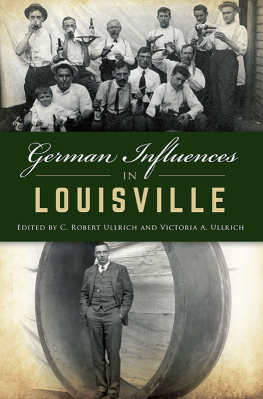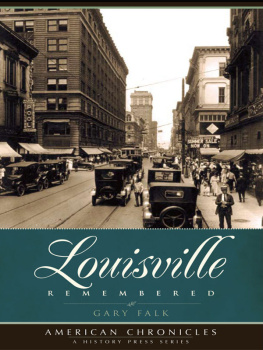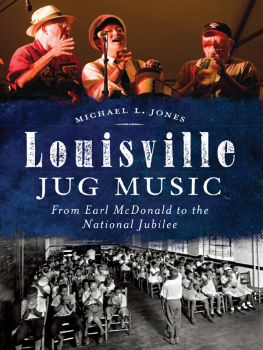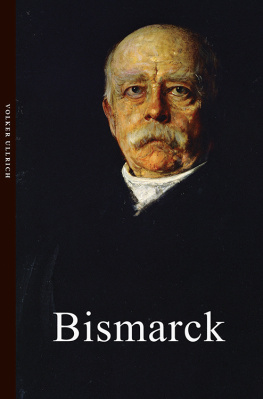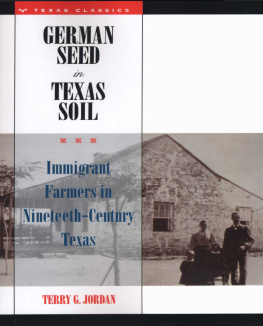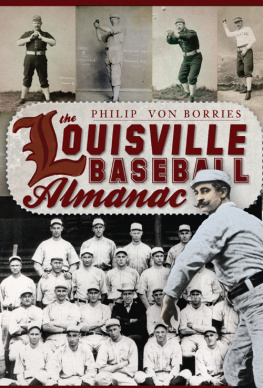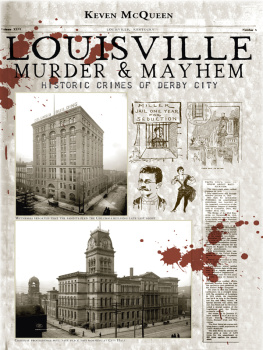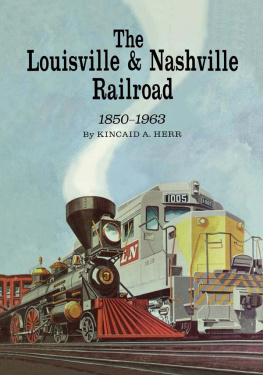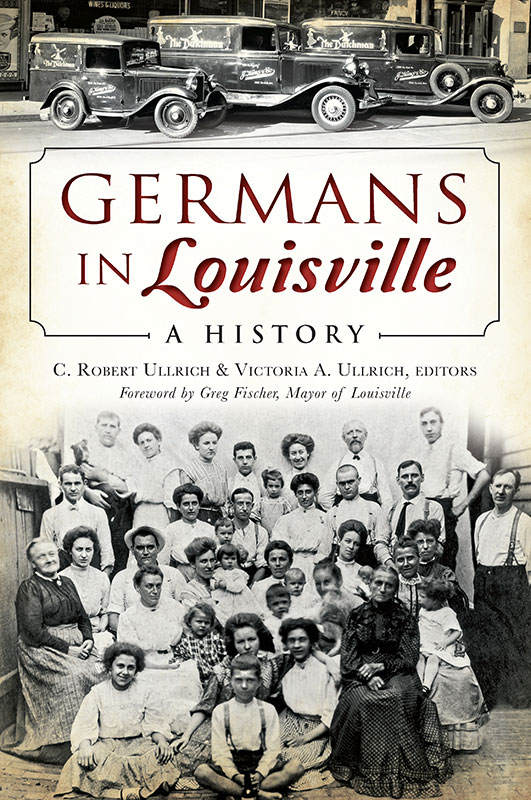
Published by The History Press
Charleston, SC 29403
www.historypress.net
Copyright 2015 by C. Robert Ullrich and Victoria A. Ullrich
All rights reserved
Front cover, bottom: Courtesy C. Robert Ullrich and Victoria A. Ullrich.
First published 2015
e-book edition 2015
ISBN 978.1.62585.185.7
Library of Congress Control Number: 2015946485
print edition ISBN 978.1.62619.654.4
Notice: The information in this book is true and complete to the best of our knowledge. It is offered without guarantee on the part of the authors or The History Press. The authors and The History Press disclaim all liability in connection with the use of this book.
All rights reserved. No part of this book may be reproduced or transmitted in any form whatsoever without prior written permission from the publisher except in the case of brief quotations embodied in critical articles and reviews.
In memory of J. William and Katherine H. Klapper
CONTENTS
FOREWORD
Germans are one of Louisvilles oldest immigrant groups, having arrived in our city nearly two hundred years ago. In the nineteenth century, so many Germans immigrated to Louisville and other Ohio River cities that nearly 20 percent of our population was German born by 1850. The tide of German immigration did not subside until World War I.
German contributions to Louisville have been significant to our growth as a city. German immigrants brought with them a love of learning, music and art, as well as a physical prowess that was used to build many of the tangible structures we know today. Although the period of German immigration to our city has come to an end, more than one-third of the members of our community claim German ancestry.
Given that the last history of the German experience in Louisville was written in 1873, the addition of this book to the written history of our city is long overdue. As a fifth-generation descendant of Johann George Fischer of Zeiskam, Germany, and mayor of a city that embraces the importance and value of international diversity, I would like to thank those who were involved in writing this book for their contribution to our community, and I congratulate them on its publication.
Greg Fischer
Mayor of Louisville
ACKNOWLEDGEMENTS
We would like to thank everyone who contributed to this book, especially the chapter authors. We also would like to acknowledge John E. Kleber and Mary Jean Kinsman for serving as manuscript editors, Mary Ann Sherby for serving as copy editor and Jordan M. Gabbard for proofreading the German content of the manuscript.
Special thanks are due to Gill Holland for his initial encouragement to pursue this project, Reverend R. Dale Cieslik for his research assistance at the Archdiocese of Louisville Archives and the many individuals who graciously provided materials from personal collections. Finally, we would like to acknowledge the University of Louisville Archives and the Filson Historical Society for the use of their photographic collections.
1.
OVERVIEW
BY C. ROBERT ULLRICH, JANE K. KELLER AND JOSEPH R. REINHART
Germans were one of the largest European groups to come to the United States. Although several Germans were part of the Jamestown colony, the first permanent German settlement in America was not established until 1683. In that year, Franz Daniel Pastorius led a group of Mennonites and Quakers from Krefeld, Westphalia, to found Germantown, northwest of Philadelphia.
About one-third of the Germans who came to America during the colonial period settled in Pennsylvania, where they became known as the Pennsylvania Dutch. Most of the others who immigrated during this period went to Upstate New York, Maryland, Virginia and the Carolinas.
Among the early German immigrants to America were the Bruner, Blankenbaker and Funk families. Their descendants came to eastern Jefferson County as early as 1789, when Christ Lutheran Church was established near Brunerstown (now Jeffersontown). The early settlers of Jeffersontown included many German-speaking migrants from the Germanna colonies of Virginia, as well as others from Maryland and Pennsylvania and a few new arrivals from Germany.
Many settlers of German ancestry also were found in Louisville in the late eighteenth century. Among these was a Mr. Kaye, who built the first brick house in the city in 1789. However, it is believed that the first Germanborn immigrant to settle in Louisville was Augustus D. Ehrich, a master shoemaker from Knigsberg, Prussia, who arrived in 1817.
German immigration to Louisville progressed slowly in the early nineteenth century until the introduction of steamboat travel on the Mississippi and Ohio Rivers. As upriver travel from New Orleans became easier, the German populations of river cities, such as Evansville (Indiana), Louisville, St. Louis and Cincinnati, began to flourish.
By the 1830s, distinct German immigrant neighborhoods had formed both east and west of the Louisville city center. The first churches in which German was spoken were established in the eastern neighborhood known as Uptown (now Phoenix Hill). St. Paul Evangelical Church, the first German Protestant church in Louisville, was founded in 1836. St. Boniface Catholic Church, the first German Catholic church and only the second Catholic church in the city, was established in 1837. St. John Evangelical Church was founded in 1843, the Zion Reformed Church was established in 1849 and St. Martin of Tours Catholic Church was founded in 1853. Other German Protestant churches founded before the Civil War included Methodist and Baptist churches, but the first Lutheran church was not established until 1878.
In the western neighborhood, Immaculate Conception (St. Mary) Catholic Church was established in 1845. St. Peter Evangelical Church was formed in 1847, and St. Luke Evangelical Church was founded in 1850. St. Peter Catholic Church was established south of Broadway in 1855.
Temple Adas Israel, the first Jewish congregation in Louisville, was organized by German immigrants in late 1842, and it was chartered early the next year. Adas Israel was reformist in its outlook, so in 1851, Beth Israel was founded to serve more traditional Jews.

Franz Daniel Pastorius sculpture, Philadelphia. Courtesy Library of Congress.
In 1849, the administration of St. Boniface Catholic Church was assumed by Austrian Franciscan priests assigned to Louisville from Cincinnati. Later, St. Martin of Tours Church and several other German Catholic churches also were staffed by the Franciscans. In 1858, Bishop Martin J. Spalding sent Father Leander Streber, OFM, the pastor of St. Martin of Tours Church, to Germany to seek nuns to teach German children in his parish and other parishes in the Diocese of Louisville. Three Ursuline sisters from Straubing, Bavaria, arrived in Louisville that year and immediately began teaching at St. Martin of Tours School. By the turn of the century, Ursuline sisters staffed all of the schools in the German-speaking Catholic parishes.
Schools also were established by several German Protestant congregations, most notably St. Paul Evangelical Church and St. John Evangelical Church. Both the First German Lutheran Church (now Concordia) and the Second German Lutheran Church (now Redeemer) organized long-lived schools in the late nineteenth century.


